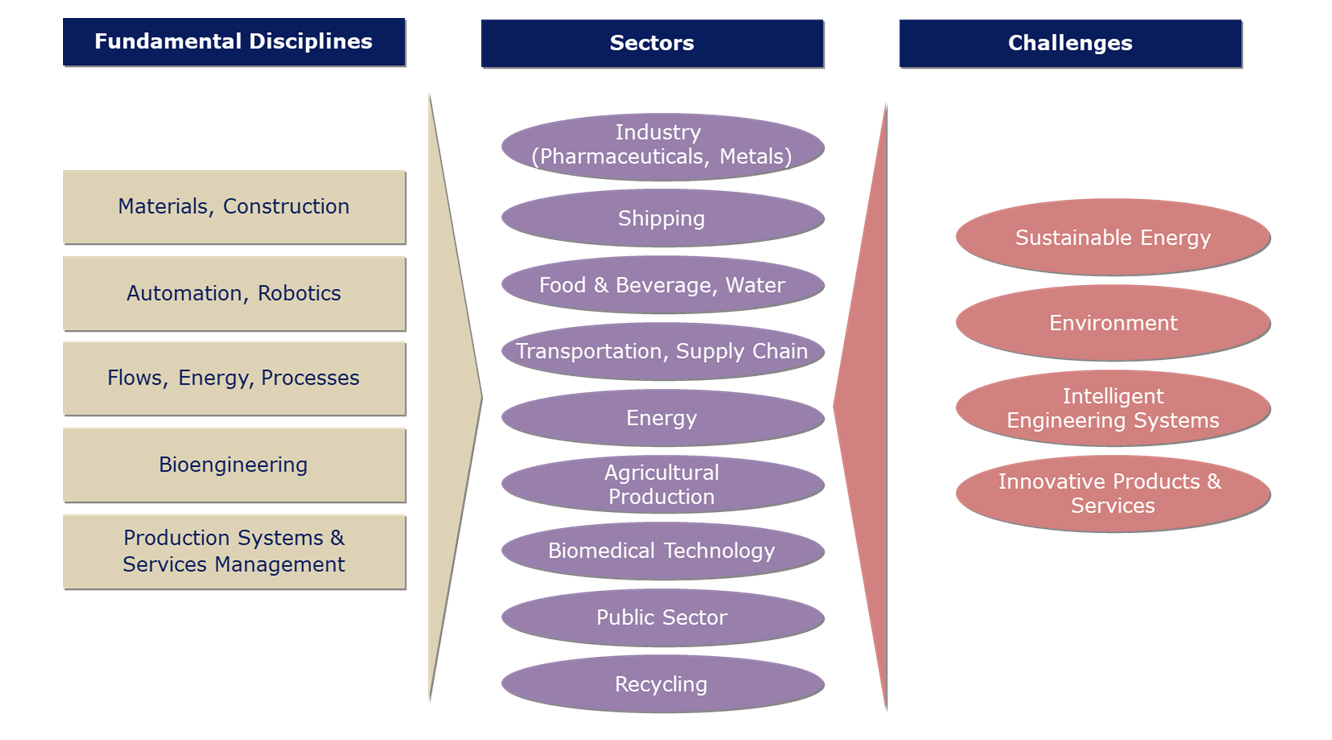School Strategic Plan
Time Scale 2018 - 2023
Α. Education & Learning Goals
B. Research Goals
C. Organizational and Administration Goals
D. Societal Engagement Goals
School Strategic Plan
Α. Education & Learning Goals
(a) To educate Mechanical Engineers who can contribute to the Greek society, and who will be competitive both in Greece and internationally, capable of developing and utilizing breakthrough technologies, across a variety of fields.
(b) To emphasize modern skills. Mechanical Engineers design and manufacture machines, products and processes, or manage projects and large systems. Therefore, they should be able to resolve design and management problems that include the following stages: (i) definition and modeling of the problem, (ii) model analysis and solving (detailed design), (iii) implementation/manufacturing. Usually, courses focus mainly on model analysis and solving. In addition, emphasis will be placed on both the early stages (definition and modeling of the problem) and the final stages (implementation/manufacturing).
(c) To enhance the educational process. The educational process must become more meaningful and attractive to students, presenting a learning experience based more on hands-on activities than on passive presentation of knowledge. Appropriate initiatives and actions will be undertaken so that students do not consider their studies as a plain procedure (sit for exams - obtain the degree), but as a process through which they will acquire essential knowledge and develop skills good for their entire professional career.
(d) To strengthen course areas:
- Biomedical technology
- Renewable energy sources and energy saving
- Intelligent systems for production, transportation, and energy
- Robotics
- Advanced materials and nanotechnology
- Sustainable development and circular economy
B. Research Goals
(a) To stimulate/encourage interdisciplinary research through inter-sectoral/ departmental/university cooperation. The current trend, especially in engineering, requires synergy between various scientific areas and the exchange of successful application examples. After all, this trend can lead to innovations in both the research and applications fields.
(b) To stimulate/encourage International research collaborations. International research collaborations have multiple benefits, both for faculty/researchers, such as interaction with other colleagues and research traditions, exchange of experience, ideas and methods, as well as for the School, such as expansion of complementary collaborations, dissemination of achievements, improvement of reputation. Therefore, the School will be supportive of such activities.
(c) To encourage a response to the challenges of basic and applied research: Figure 1 presents the School’s fundamental areas of research, the sectors for which applications are being developed, and the current challenges that research and applications need to meet. It is important for the School to encourage its members to respond to the challenges depicted in Figure 1, as far as both basic and applied research are concerned.

Figure 1. Fundamental areas, sectors and challenges for further research for the School of Mechanical Engineering..
(d) To publicize faculty research results. Research carried out -and especially the applied one- must be promoted both nationally and internationally. In parallel to publications in peer-reviewed journals and international conferences, results will be disseminated through other means of communication, reaching all possible audiences. This can facilitate attracting funding and collaborations, as well as the improvement of the School reputation.
C. Organizational and Administration Goals
(a) To reinforce the strategic role of the School’s Collective Bodies. The existing university legislative framework obliges the Collective Bodies to deal with a multitude of issues, many of which are mundane; as a result, strategic issues are not addressed adequately. Therefore, efforts will be made to make time available for developing the School’s Strategy.
(b) To integrate School Internal and External Evaluations. Data is being collected to be made available for the School’s Internal and External Evaluation, aiming at its continuous improvement. However, for the same reasons as in (a) above, these data, as well as the resulting conclusions, are not discussed sufficiently at the School’s Collective Bodies, and measures are not taken. Adequate discussion of these conclusions must be achieved so as to have the first strategic objective addressed.
(c) To renovate and maintain of the School premises. The School infrastructure (buildings, networks, etc.) were built eighteen years ago. The financial crisis has been a significant obstacle to renovation and maintenance. Therefore, NTUA allocated funds should take into account the School’s needs for infrastructure renovation and maintenance.
(d) To exploit Information Technology. Many School functions are ruled by time-consuming and bureaucratic procedures; these are further burdened by their incomplete and/or problematic computerization. Although the improvement of the situation is constrained by the complex legal framework and dependent on NTUA services, it is possible to simplify some procedures and make better use of the information technology by developing local applications.
D. Societal Engagement Goals
(a) To reinforce relations with other Universities and Research Centers. School faculty maintain collaborations with Universities and Research Centers in Greece and abroad mainly at the individual level. Ways should be found to enhance such relations at the School level as well.
(b) To strengthen relations with entities employing Mechanical Engineers. School faculty members have developed cooperation with potential employers of graduates, such as public and private organizations, industries, etc. at the personal level. Ways should be found to enhance these interactions at the School level as well.
(c) To enhance relations with our Alumni. School Alumni is a School asset. Alumni can assist in a variety of ways such as providing feedback on the curriculum, offering internships, making opportunities for applied research available, providing funding, etc.). Therefore, it is necessary to strengthen ties between the School and its alumni.
(d) To increase the visibility of the School’s teaching and research efforts. During its 130 years of operation, the School has built an excellent reputation nationally and internationally. Using the available modern media, the visibility of its work will be promoted in a more focused way, aiming for example at future and present students, graduates, professional engineers, potential employers and associates, and the society.
(e) To volunteer in assisting sensitive social groups. The School will develop volunteering initiatives towards sensitive social groups, such as people with disabilities, unemployed graduates, people affected by natural disasters, etc.


